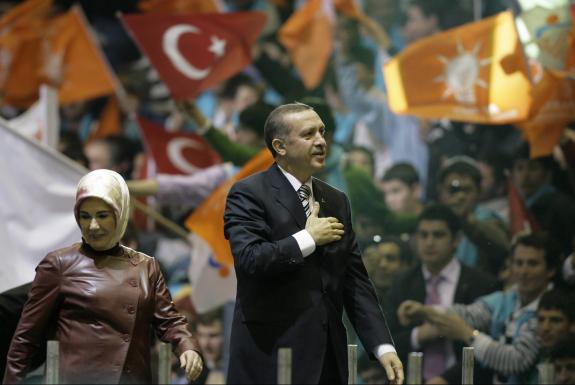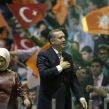
Imprisoned Deputies Highten Tensions Before New Turkish Parliament Takes Oath
Publication: Eurasia Daily Monitor Volume: 8 Issue: 125
By:

Following the parliamentary elections on June 12 in the wake of a heated election campaign, Turkish politics remains unsettled. While the sweeping victory of the Justice and Development Party (AKP) dominated the discussions initially, attention has shifted to Turkey’s sharp political intrigues and political crises caused by the controversial interventions of judicial bodies into electoral processes.
The AKP won 49 percent of the popular vote and 326 seats in parliament, while the main opposition CHP won 135 seats, and the MHP secured 53 seats. In yet another remarkable success story, the block of independent candidates, supported by the pro-Kurdish BDP and smaller leftist parties, won 36 seats (Anadolu Ajansi, June 13).
AKP’s electoral victory set an unequivocal record in Turkish history. Since its rise to power in 2002, it has managed to win the 2007 and 2011 elections, and more importantly achieved this by increasing its share of the vote. AKP’s success in preventing the erosion of its popularity is attributed to its effective management of the economy and the provision of infrastructure projects and basic services, which resulted in substantial improvement in the living conditions of the lower and middle income voters. Moreover, the inability of the opposition parties to present a viable alternative, as well as the AKP’s success in describing itself as a reformist force, has augmented the AKP’s appeal in the eyes of the Turkish electorate.
While the AKP consolidated its image as a formidable force, concerns were raised by opposition parties as to how it would wield power. Prior to the election, the AKP made it a declared aim to rewrite the Turkish constitution. Such announcements by the AKP leaders, and Prime Minister Recep Tayyip Erdogan’s claims that they might transform the current parliamentary system into a presidential one had caused concern in some circles in the country, who increasingly accuse Erdogan of demonstrating authoritarian tendencies.
One relief for the skeptics came with the announcement of the results. Due to the good showing of the independent candidates and the MHP’s ability to pass the 10 percent electoral threshold, the AKP’s landslide victory did not help it secure the 330 seats required to change the constitution through a referendum, let alone the 367 seats required to change the constitution in the parliament. With the current distribution, the AKP has to seek consensus within parliament. Indeed, during his victory speech on election night and in his subsequent statements, Erdogan sought to reach out to the opposition parties, asking them to set aside their bitter verbal exchanges and bad memories from the election campaign, and work towards drafting a more democratic constitution. While the reactions from other parties were mixed, the CHP leader Kemal Kilicdaroglu did not close the door on Erdogan’s request, yet he set several preconditions for a new constitution (Cihan, June 17).
One point that unites the opposition parties is their insistence that the new constitution should not come as a top-down imposition by the AKP. Rather, it should be drafted by a broad-based participatory committee representing all parties, civil society organizations and professional associations. It remains to be seen how the AKP will manage to build bridges with other parties and what would be the lowest common denominator for constitutional reform. In any case, given the reaction by opposition parties so far, it appears the AKP will find it difficult to insist on changing the nature of the political system and transitioning to a presidential one.
Interestingly, the CHP has many internal problems, which might hold it back from entering into a meaningful dialogue with the government over a new constitution. Prior to the election, the CHP’s new leader Kilicdaroglu had raised expectations that he could mount a credible challenge to the AKP. To do so, he overhauled the party’s inner organization as well as reforming the party’s political program. Moreover, in a significant departure from the CHP’s traditional image as a center-left social democratic party with strong Kemalist credentials, Kilicdaroglu sought to move even closer to the center and adopted a platform reminiscent of rightist parties. He even formed an election coalition with some political figures from the center-right, who eventually were elected as deputies on a CHP ticket. Although Kilicdaroglu’s “new CHP” performed better in the elections than his predecessors, the 26 percent was far from satisfying the highly-inflated expectations. As a result, the old guard in the CHP has already rebelled against Kilicdaroglu, calling on him to account for the election “defeat,” and going as far as to demand his resignation (Haberturk, June 14). Unless Kilicdaroglu defeats the intra-party opposition his ability to play an influential role in Turkish politics will be limited.
The real controversy erupted with the announcement by the Supreme Election Board (YSK) of the final lists. The YSK invalidated the election of one independent deputy from the BDP who is currently in jail for being suspect in a case involving the outlawed Kurdistan Workers’ Party (PKK) and a previous conviction in a separate case. To complicate matters further, Turkish courts undersigned further controversial rulings by refusing to approve the release of other imprisoned politicians who were elected to parliament on June 12. While a total of six politicians from the BDP list are denied release from prison because of the ongoing investigation into PKK related charges, two other deputies who ran on the CHP ticket, who are suspects in the Ergenekon trial, also faced the same fate. In yet another case, a Turkish court denied a release warrant for one deputy elected from the MHP list, standing trial in the Sledgehammer case (Hurriyet, June 26).
The ongoing imprisonment of elected deputies caused havoc ahead of the oath-taking ceremony slated for June 28. While the BDP announced it would boycott the parliament until its deputies are released, the CHP and MHP, despite their stark criticism of court rulings, have not followed suit. The eruption of this crisis even before the new Turkish parliament convenes seems to be a harbinger of new crises. If Erdogan manages to handle effectively this impending crisis through clever legal maneuvering, he might gain an advantage to build bridges with the opposition when he embarks on his drive for a new constitution.




